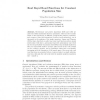114 search results - page 20 / 23 » New topologies for genetic search space |
GECCO
2007
Springer
14 years 2 months ago
2007
Springer
Recent work has provided functions that can be used to prove a principled distinction between the capabilities of mutation-based and crossover-based algorithms. However, prior fun...
GECCO
2005
Springer
14 years 2 months ago
2005
Springer
Recurrent neural networks are theoretically capable of learning complex temporal sequences, but training them through gradient-descent is too slow and unstable for practical use i...
GECCO
2003
Springer
14 years 1 months ago
2003
Springer
Evolutionary and genetic algorithms (EAs and GAs) are quite successful randomized function optimizers. This success is mainly based on the interaction of different operators like ...
SIGMOD
2010
ACM
14 years 1 months ago
2010
ACM
Fast query processing of complex objects, e.g. spatial or uncertain objects, depends on efficient spatial pruning of the objects’ approximations, which are typically minimum bou...
CGO
2011
IEEE
13 years 10 days ago
2011
IEEE
—Approximating ideal program outputs is a common technique for solving computationally difficult problems, for adhering to processing or timing constraints, and for performance ...

